here the summary in English of an article published by "Sapo" in Portuguese:
The detection of the SARS-CoV-2 virus in wastewater allows the early identification of new outbreaks and will be extended to the whole country, with a pilot project having detected two variant mutations before the health authorities were aware of them.
The Covidetect pilot project has been running since last year and preliminary results were presented on the 26th of May in Lisbon, at the Wastewater Treatment Plant (WWTP) in Alcântara, Lisbon, with the authors explaining that the data collected in the wastewaters followed the daily evolution of the covid-19 pandemic in recent months. With the project, it was possible to detect, in Gaia, mutations of the California and Nigeria variants of the virus.
The pilot project will end in August, but the minister of Environment and Climate Change, João Pedro Matos Fernandes, who attended the ceremony, assured that the analysis of water from the WWTP will continue and expand. João Pedro Matos Fernandes stressed that not all WWTPs are prepared to carry out this detection yet, but that it is "absolutely essential" to extend the pilot project, so that water analysis becomes "a common rule for WWTPs across the country ". The WWTP that will be built or refurbished will have to be prepared for this type of analysis.
The pilot project was applied to five WWTPs in Lisbon, Cascais, Gaia and Guimarães, and the circulation of the virus in the effluent drainage networks of three reference hospitals was also monitored. Health Minister Marta Temido, who also participated in the presentation of the preliminary results of Covidetect, considered it a “powerful instrument” to fight the current pandemic and future pandemics, stressing the importance of acting as early as possible.
The next phase of the project involves disseminating the results and creating a real-time warning system to notify health and environmental authorities of the re-emergence of the virus. 760 samples of wastewater were analyzed between April 27 and December 2, 2020, "confirming that the data obtained for SARS-CoV-2 from untreated wastewater followed, in a very adjusted way, the new daily cases reported for the regions where the tested WWTP in this study are located”, said the authors.
Those responsible for the project have been collaborating with the European Commission in the EU Sewage Sentinel System for SARS-CoV-2. The Commission has already made a recommendation for a common approach to the surveillance of SARS-CoV-2 and its variants in EU wastewater. The recommendation indicates that WWTP with dimensions above 150 thousand inhabitants should be monitored.
Countries such as Australia or New Zealand are already using WWTPs as a “sentinel”, creating an 'online' system in which WWTPs appear with a green color, which turns red when genetic material from the virus is detected.
https://24.sapo.pt/atualidade/...
